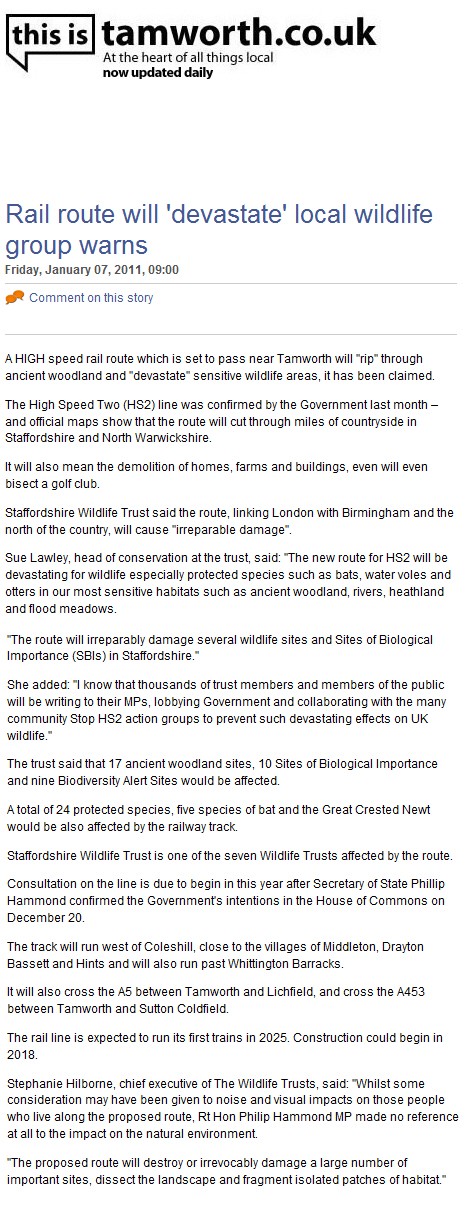The cost of progress?
5 posters
Page 1 of 1
 The cost of progress?
The cost of progress?
Yet again woodlands and wildlife due to suffer the cost of progress!
SM
SM

Safari Maiden- Posts : 3392
Join date : 2010-05-05
Age : 54
Location : Midlands
 Re: The cost of progress?
Re: The cost of progress?
Reading that you would think with all that it will destroy it would be able to put a stop to it? Soon the UK will be all roads, railways, airports and houses and not a stitch of green around. Is this really what it is going to come to - urban sprawl everywhere 
Lai
Lai

Laikipia- Moderator
- Posts : 16153
Join date : 2010-05-13
Age : 64
Location : Cheshire
 Re: The cost of progress?
Re: The cost of progress?
I suppose all planning restrictions, with regaurd to Hbitat, and Wildlife will be completly ignored, because it suits, and all to save 20mins journey time, that will spoil hours, and hours in the country side for further generations to enjoy
WS
WS
 Re: The cost of progress?
Re: The cost of progress?
That is so sad and I agree with the comments from Lai and WS.
In Worthing they wanted to build on some ancient woodland and the serious Tee Huggers got involved, at first they lost their fight then it went back to court and the Tree Huggers won the day. The council appealed and it has gone back to court. This has now gone on for a fair few years and the Tree Huggers are still holed up in the woods fighting hard to hold on to the victory. They have a lot of support not to have the woods decimated for housing.
This planet needs to hold on to it's green land and also be more respectful of it's wildlife and the protected species.
littlewid-x-
In Worthing they wanted to build on some ancient woodland and the serious Tee Huggers got involved, at first they lost their fight then it went back to court and the Tree Huggers won the day. The council appealed and it has gone back to court. This has now gone on for a fair few years and the Tree Huggers are still holed up in the woods fighting hard to hold on to the victory. They have a lot of support not to have the woods decimated for housing.
This planet needs to hold on to it's green land and also be more respectful of it's wildlife and the protected species.
littlewid-x-

littlewid- Admin
- Posts : 10464
Join date : 2009-12-28
Location : West Sussex
 Re: The cost of progress?
Re: The cost of progress?
I donate regularly to my local wildlife trust the Beds, Bucks and Oxon and visit their reserves too. The new high speed line will come within 10 miles of where I live but more worryingly in their latest newletter they have highlighted the amount of their reserves and SSSI that it will either go through or border.
The human cost seems to be the only thing that is highlighted on a lot of the reports but no mention of the wildlife cost
The human cost seems to be the only thing that is highlighted on a lot of the reports but no mention of the wildlife cost

princesspurplehippy- Posts : 1090
Join date : 2010-07-02
Age : 49
Location : Oxfordshire
 Re: The cost of progress?
Re: The cost of progress?
That sounds so typical PPH. Are your local newspapers covering it and do they have a letters section where maybe you could write a bit in favour of the wildlife.
littlewid-x-
littlewid-x-

littlewid- Admin
- Posts : 10464
Join date : 2009-12-28
Location : West Sussex
 Re: The cost of progress?
Re: The cost of progress?
I thought the point of SSSI's was as below
There are over 4,000 Sites of Special Scientific Interest (SSSIs) in England, covering around 7% of the country's land area. Over half of these sites, by area, are internationally important for their wildlife, and designated as Special Areas of Conservation (SACs), Special Protection Areas (SPAs) or Ramsar sites. Many SSSIs are also National Nature Reserves (NNRs) or Local Nature Reserves (LNRs).
SSSIs are the country's very best wildlife and geological sites. They include some of our most spectacular and beautiful habitats - large wetlands teeming with waders and waterfowl, winding chalk rivers, gorse and heather-clad heathlands, flower-rich meadows, windswept shingle beaches and remote uplands moorland and peat bog.
It is essential to preserve our remaining natural heritage for future generations. Wildlife and geological features are under pressure from development, pollution, climate change and unsustainable land management. SSSIs are important as they support plants and animals that find it more difficult to survive in the wider countryside. Protecting and managing SSSIs is a shared responsibility, and an investment for the benefit of future generations.
The unique and varied habitats of SSSIs have developed over hundreds of years through management practices such as grazing and forestry, and need active management to maintain their conservation interest. Natural England works with over 26,000 separate owners and land managers, who work very hard to conserve these important sites. Maintaining goodwill and building upon the enthusiasm, knowledge and interest of owners is vital to successfully manage these nationally important sites.
So why can this still happen? Similarly green belt one day and then when it suits green belt no longer
Lai
There are over 4,000 Sites of Special Scientific Interest (SSSIs) in England, covering around 7% of the country's land area. Over half of these sites, by area, are internationally important for their wildlife, and designated as Special Areas of Conservation (SACs), Special Protection Areas (SPAs) or Ramsar sites. Many SSSIs are also National Nature Reserves (NNRs) or Local Nature Reserves (LNRs).
SSSIs are the country's very best wildlife and geological sites. They include some of our most spectacular and beautiful habitats - large wetlands teeming with waders and waterfowl, winding chalk rivers, gorse and heather-clad heathlands, flower-rich meadows, windswept shingle beaches and remote uplands moorland and peat bog.
It is essential to preserve our remaining natural heritage for future generations. Wildlife and geological features are under pressure from development, pollution, climate change and unsustainable land management. SSSIs are important as they support plants and animals that find it more difficult to survive in the wider countryside. Protecting and managing SSSIs is a shared responsibility, and an investment for the benefit of future generations.
The unique and varied habitats of SSSIs have developed over hundreds of years through management practices such as grazing and forestry, and need active management to maintain their conservation interest. Natural England works with over 26,000 separate owners and land managers, who work very hard to conserve these important sites. Maintaining goodwill and building upon the enthusiasm, knowledge and interest of owners is vital to successfully manage these nationally important sites.
So why can this still happen? Similarly green belt one day and then when it suits green belt no longer
Lai

Laikipia- Moderator
- Posts : 16153
Join date : 2010-05-13
Age : 64
Location : Cheshire
Page 1 of 1
Permissions in this forum:
You cannot reply to topics in this forum
 Register
Register

